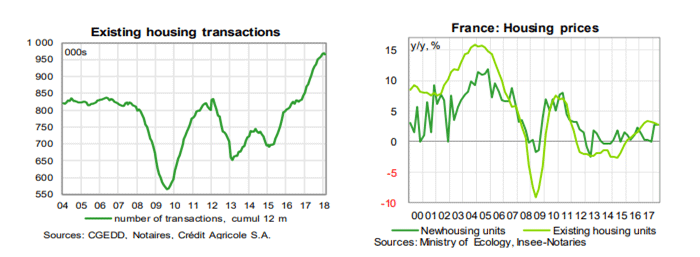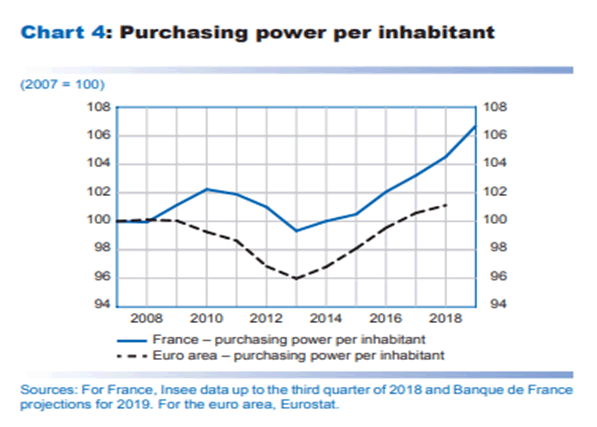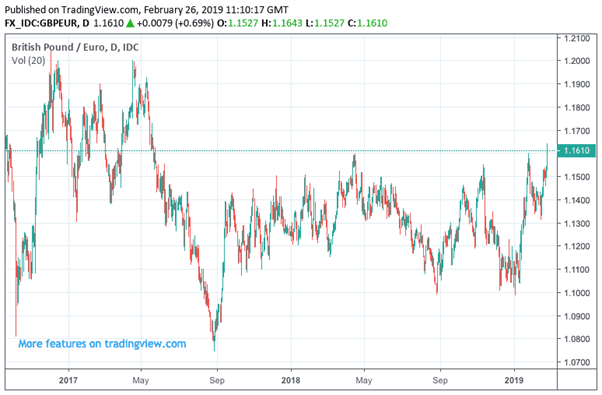The problem with Brexit is that depending on what country you’re in, you’re fed an entirely different story of what is going on and what will happen. If you’re in Germany, it’s the doomed automotive sector, if you’re in France it’s the plague of the gilet-jaunes, for the Portuguese it’s an impending debt crisis an if you’re in the UK, you’ll be told everything is bad.
If I told you the French housing market was booming at a 21st century high, UK unemployment is at a 44-year record low and that the devaluation of the euro has made the entire bloc more internationally competitive, you would assume I was lying, fact.
The problem is the press. In economics you base all assumptions off rational decision making. Rational individuals would turn to reputable, academic and verified sources. Tabloids like The Sun have a purpose but their pursuit of contentious headlines does not benefit consumers seeking their own economic prosperity. Halcyon Development will be providing bi-weekly updates on the Brexit/Euro economy from the sources listed below:

Under The Microscope: France
The world’s fifth biggest economy. Relatively unshaken by the 2008 recession due to its stable, self-sufficient service economy, the impacts of Brexit are forecast to be minimal. With a breath of fresh air from Macron, the French economy has been on the rise. Taking the most stable asset as an example:

Since entering the 21st century, the trend has been modest. Stumped by the 2008 global recession, then faced with a minor blip in the 2012 double-dip, the trajectory has since been stable and upward. The low housing prices explain the heightened levels of housing transactions. With housing transactions at an all-time high, this signals that both supply and demand in the economy are strong, with the relatively low and stable prices making property investments lucrative. The housing market is bolstered by fixed long-term mortgage rates as low as 2.15% (for non-citizens too). The French economy benefits from the same profitable rental returns the UK economy has, seeing 3-5% as the generic rate.

The housing market is benefiting from such sustained success because of the cooling effect of politics. Whereas pre-recession supply and demand bubbled uncontrollably, the political arena in the EU has acted as a handbrake on the economy. Minor fluctuations coupled with prolonged uncertainty have kept prices from rising too quickly. Government reforms and expansionary fiscal policies have seen consumer purchasing power rise. With inflation forecast to dip in 2019, private consumption is set to increase steadily.
The passing of the gilet-jaunes, the introduction of the MUES and low inflation all point towards a prosperous 2019 with increased purchasing power:
Increased purchasing power in accordance with forecasts to reduce interest rates will see consumer demand rise in 2019. The consequence of which will be an increase in inflation and a decrease in unemployment, moving the economy one step closer to its pre-recession strength. France, just like it did in the recession, shows its strength as a self-sufficient powerhouse. What affects the EU, affects France on a far smaller scale. It is this stability which draws foreign direct investment.

The big talking point is the Euro. The graph on the right illustrates the pound has peaked at a two year high against the euro (£1: €1.1610). The strengthening of the pound reflects the growing consensus that the UK is headed towards a soft Brexit. This appreciation means British consumers will be in a stronger position to inject funds into France. The Euro has struggled most against the dollar, with 2019 seeing a -7.37% devaluation (€1: $1.13). With core-inflation levels relatively constant in both the US and the Euro Zone, it is expected that a flat rate of circa 1:1.15 will be seen throughout 2019.
Regarding the pound and Brexit, it is widely accepted the only outcome which will distort currency trading is a harsh no-deal. As of 21/03, Theresa May’s request to delay proceeding until June 30th has been rejected, however 3 million citizens (and counting) have signed a petition for Article 50 to be revoked.
- Worst Case Scenario: A No-Deal Brexit will sink the pound by approximately 10%. This will increase the purchasing power of the Eurozone versus the pound.
- Best Case Scenario: Soft Brexit/Remain will likely see a currency appreciation as the Eurozone economy’s handbrake, consumer uncertainty, will be lifted and confidence will revive.
Why invest in property?
- The wealth effect: You own an asset that will increase in value over time more consistently than any other investment. The implications of inflation benefit both value and rental returns.
- In terms of volatility, investing in properties promises you steady returns over a long period of time. According to the National Council of Real Estate Investment Fiduciaries (NCREIF), commercial properties provided almost 8.4% returns in ten years (2000–2010). This is because unlike stocks and bonds, real estate is a stable and risk-free industry.
- Rental Income: With sole rights to your asset, you choose who, when and how much you would like to rent your asset for. This allows you to choose the right time to sell whilst making a return, offset mortgage costs and given the stability of the asset, the rental return is secure and easy to forecast.
How is the overseas property market affected by Brexit?
The overseas property market is affected by Brexit in five main areas: Currency, tax, visas, mortgages and pensions.
- Currency, as touched upon above: Brexit is a nuisance in the press, however it is not damaging currency as much as anticipated. Either outcome of Brexit will damage the pound mostly, the eurozone will only suffer minor tremors.
- Tax: Taking France as an example, capital gains tax is a set rate for all EU states. Non-EU investors are subject to a social charge on top. The UK currently has 120 treaties with individual states preventing double-taxation. This number will likely grow too with Brexit to protect investors.
- Visas: This depends on whether you’re a Schengen citizen or not. The European Commission have confirmed that, as of 2021, citizens will need to apply for an ETIAS visa and be granted free travel for up to 90 days in a 180-day period. For non-EU citizens, the visa system will remain the same. Property purchase rights do not differ whether you’re an EU citizen or not. Your only concern should be if you intend to holiday for more than three months at a time, in which case the visa you apply for will differ.
- Mortgages: Brexit will see a quick slump in house prices and monetary policy will remain expansionary. Mortgage rates are very low presently, so low that there is not much room for them to be lowered.
In economics there is something called a ‘speculative boom’. This is when assets are traded under the false notion that the economy is booming and money is in abundance. When this bursts, as seen with the 2008 real estate bubble, prices plummet to their normal values. The EU is currently experiencing the opposite of a speculative boom, courtesy of gross misinformation. Assets are being traded at an all-time high, but prices aren’t reflecting that because consumers are plagued with political anxiety. It is only a matter of time before the political realm calms, at which point, consumers who have been capitalizing on low prices and low mortgage prices will benefit from those who have been safely waiting for the storm to pass before investing. Hence, when the storm passes, consumers will have renewed confidence and accumulated savings to invest. This will see a sudden demand-side shock for investments, consequently knocking up inflation. This inflation will be the pure profit that current investors will reap. The ‘Brexit Bounce’ will see prices soar once a settlement is met and those who made their moves early will benefit before contractionary monetary policies return.
References
Credit AgricoleAllianz
Banque France
Medium
Investopedia
